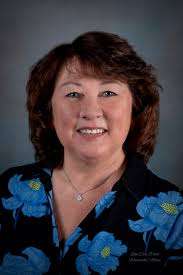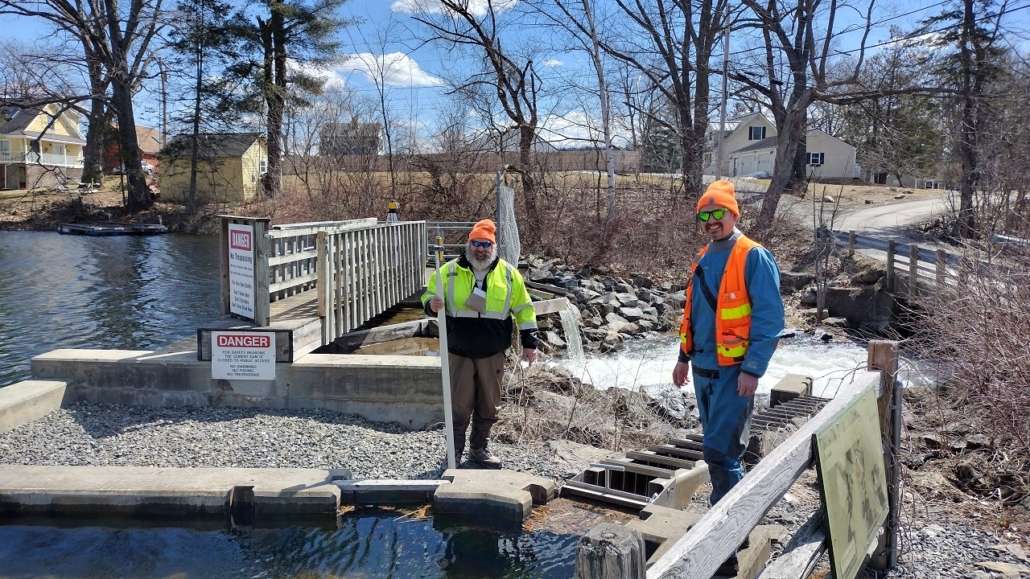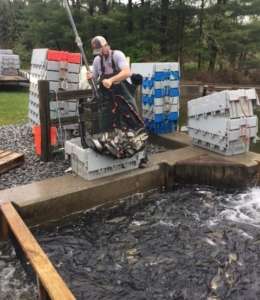China transfer station committee members struggle with unauthorized users
 by Mary Grow
by Mary Grow
China transfer station committee members pondered two questions at their May 9 meeting: how to make a second regional household hazardous waste day as successful as the one April 22 (if China hosts one again); and how to continue to reduce the number of unauthorized transfer station users.
A regional household hazardous waste day lets residents of participating towns (on April 22, China, Albion, Palermo, Windsor and Winslow) dispose for free of types of waste that do not go into the mixed waste stream, like paint, old gasoline, household chemicals and electronics (television sets, stereos, VCRs, for example).
The day was a huge success, with an estimated 400 people (twice the number who signed up in advance) coming to the public works building west of the transfer station and long lines of vehicles waiting to get in, committee members said.
Some people obviously brought things they’d stored for years. The China transfer station accepts most types of what is considered household hazardous waste, but charges a fee for some.
“We did a lot of good for the communities,” committee member Robert Kurek, from Palermo commented.
China Director of Public Services Shawn Reed had three suggestions for continuing the collection days.
First, he recommended enforcing the pre-registration requirement.
Second, he suggested town officials consider budgeting for annual collection days, because the Kennebec Valley Council of Governments (KVCOG) grant that funded most of the April 22 event might not be available in future years.
And third, he recommended trying to hold future collections at one of the China schools, instead of the public works garage, for more space and better traffic circulation.
According to statistics distributed at the May 9 committee meeting, getting rid of the collected materials cost more than $20,000. Each participating town contributed $500; the grant covered the rest.
Olivia Kunesh, of KVCOG, said in an email that a company called EPI – found on the web as Environmental Projects, Inc., of Auburn – took away the collected waste and recycled the old paint. Removal of electronic waste (e-waste) was delayed more than a week, committee members said, and Kunesh wrote that a means of dealing with e-waste needs to be found.
Other towns host such events at their schools, Reed said. Having seen the care taken to avoid spills or otherwise damage the public works area at the April 22 event, he does not think there would be any risk.
The day’s traffic spilled over to the nearby transfer station, which was the site of the annual drug takeback day. Manager Thomas Maraggio said 996 people came in, close to double the usual Saturday traffic.
The Transfer Station Committee’s second issue, discussed at several previous meetings, was how to make sure only China and Palermo residents use the transfer station that their taxes help support. The present RFID (Radio Frequency Identification) program, started in 2019 with a state grant, provides tags that an electronic sensor recognizes; driving in without a tag alerts attendants.
The main problem with the RFID tags is that people can keep them after they move out of town, and can lend them to out-of-town relatives and friends whose transfer stations might be more expensive or less convenient. Maraggio said staffer Cheyenne Houle had tried unsuccessfully to find a way to link the RFID system with town office records that might show someone had moved away.
Before RFID, transfer station users had a vehicle window sticker with the license plate number. Committee members said stickers, or lack thereof, send no message to transfer station staff; and some people don’t want a sticker on their car.
Another method discussed previously and mentioned May 9 would be to add a guard shack where a staffer would check each vehicle coming in.
Reed and Town Manager Rebecca Hapgood commended Maraggio and his staff for their efforts to minimize unauthorized transfer station use.
In other business, Maraggio distributed copies of a Dec. 6, 2022, marketing report from the Maine Resource Recovery Association summarizing the lower market for recyclable materials. Recycling income has declined substantially, he said; but generally, recycling is still less costly than having materials transported and disposed of as waste.
Because the committee’s usual second Tuesday meeting falls on election day in June, the next meeting is scheduled for 9 a.m. Tuesday, June 6.




 Maine Arts Academy recognizes all 41 graduates of the class of 2023, according to a news release from Diane Manter at the academy. Among the class’s top ten seniors are Alexis Scott, who was second, and Alyssa Gagne, who was third, both of Windsor.
Maine Arts Academy recognizes all 41 graduates of the class of 2023, according to a news release from Diane Manter at the academy. Among the class’s top ten seniors are Alexis Scott, who was second, and Alyssa Gagne, who was third, both of Windsor.







 Adding a deck to your home not only enhances its aesthetic appeal but also provides an inviting space for outdoor activities and gatherings. In Maine, with its harsh climate and stunning natural beauty, building a deck requires thoughtful planning and consideration. In this article, we will discuss the factors to consider when adding a new deck, the costs associated with such a project, the options for DIY or hiring a contractor, and how to build a deck that withstands Maine’s weather conditions.
Adding a deck to your home not only enhances its aesthetic appeal but also provides an inviting space for outdoor activities and gatherings. In Maine, with its harsh climate and stunning natural beauty, building a deck requires thoughtful planning and consideration. In this article, we will discuss the factors to consider when adding a new deck, the costs associated with such a project, the options for DIY or hiring a contractor, and how to build a deck that withstands Maine’s weather conditions. Maine residents are increasingly choosing heat pumps to improve their home’s energy efficiency and reduce heating and cooling costs. In this article, we’ll discuss what heat pumps are, their benefits, and the costs associated with upgrading a house with a new heat pump.
Maine residents are increasingly choosing heat pumps to improve their home’s energy efficiency and reduce heating and cooling costs. In this article, we’ll discuss what heat pumps are, their benefits, and the costs associated with upgrading a house with a new heat pump.